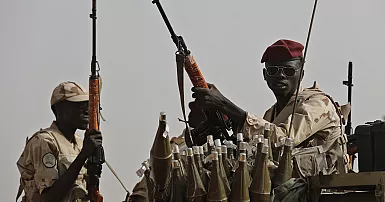Sudan and the United Arab Emirates traded sharp accusations Wednesday at a United Nations Security Council meeting, highlighting the increasing internationalization of Sudan’s 17-month-long civil war. The clash occurred as the Council voted unanimously to extend an arms embargo on Sudan’s Darfur region until September 12, 2025.

Sudanese Ambassador Al-Harith Mohamed leveled serious allegations against the UAE, accusing it of providing weapons to the Rapid Support Forces (RSF), the paramilitary group fighting against Sudan’s military government. Mohamed claimed the UAE was “profiting from this war through the illegal exploitation of gold” and prolonging the conflict that has devastated the country since April 2023.
“We have evidence of a recent weapons shipment that went through Chad to the RSF,” Mohamed told the Council. He alleged that Chad’s recently reopened Adre border crossing, intended for humanitarian aid, was being “abused” to funnel arms to the paramilitary force. The Sudanese envoy also claimed that a European bullion market had confirmed UAE’s profiteering from Sudanese gold.
In response, UAE Ambassador Mohamed Abushahab swiftly rejected the accusations, calling them “utterly false” and “baseless.” He countered by accusing Sudan’s government of refusing to engage in peace negotiations with the RSF. “To end this conflict, the SAF [Sudanese Armed Forces] must take the vital step of participating in the peace talks and summon the political courage to negotiate with their enemy,” Abushahab stated.
The UAE diplomat criticized Sudan’s military for showing “zero political courage” and accused it of using starvation as a weapon of war. He pointed to Sudan’s boycott of recent negotiations in Geneva, Switzerland, which were aimed at spurring humanitarian aid and initiating peace talks.
The heated exchange underscored the complex dynamics of the conflict, which has forced more than 13 million people to flee their homes and plunged the country into a dire humanitarian crisis. World Health Organization chief Tedros Adhanom Ghebreyesus recently reported that over 20,000 people have been killed in the fighting.

U.S. Deputy Ambassador Robert Wood emphasized the desperate situation in Darfur, where people “live in danger and desperation and despair.” He cited intense floods, restrictions on humanitarian aid, persistent human rights violations, and mass displacement as daily challenges faced by civilians.
The Security Council’s decision to extend the Darfur arms embargo was seen as a crucial step in addressing the ongoing crisis. However, some countries and human rights organizations, including Human Rights Watch, advocated for expanding the embargo to cover the entire country. Jean-Baptiste Gallopin of Human Rights Watch called the Council’s failure to extend sanctions nationwide “a missed opportunity” that should be corrected to “limit the flow of arms and curb widespread atrocities.”
The meeting also referenced a recent report by UN-backed human rights investigators, which called for an “independent and impartial force” to protect civilians in Sudan. The report accused both sides of war crimes and suggested that foreign governments arming and financing the conflicting parties could be complicit in these atrocities.
As the conflict continues to escalate, with echoes of the genocide that occurred in Darfur two decades ago, international pressure is mounting for a resolution. British Deputy Ambassador James Kariuki urged states to refrain from enhancing either side’s fighting capability and called on those with influence to bring the parties to the negotiating table.
The ongoing accusations between Sudan and the UAE highlight the regional complexities surrounding the conflict and the challenges facing international efforts to broker peace. As the humanitarian situation worsens and the death toll rises, the international community remains divided on how best to address the crisis and bring an end to the devastating civil war in Sudan.
APnews.com



